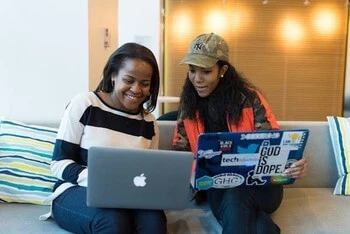6 Takeaways from Important DEIB Conversations
Find out about the results of polls from the recent HREN DEIB event.
Add bookmark
Recently, HR Exchange Network dissected the world of diversity, equity, inclusion, and belonging in a series of conversations about why this field is facing backlash, how vital it is to other aspects of HR, such as employee engagement, and what to focus on moving forward. During the course of these thought-provoking discussions, audience members responded to poll questions, and their answers revealed both the progress that has been made and the long road still ahead.
Here are the takeaways:

Buy-In from Leaders Is Meaningful
In the first poll of the DEIB event, 45% of respondents said leadership commitment and support was the most important factor in creating an inclusive workplace. Diversity and representation in decision-making roles (18%) and fostering a sense of belonging and psychological safety (17%) were the second and third most important factors. The other factors had so few respondents choose them that they are hardly notable. The large divide between the most popular response and all the others is telling.
Clearly, support for DEIB strategies - like anything else in a business - starts at the top. If leaders are not supporting or living out these belief systems, then workers will not either. After all, the leaders determine how budgets get doled out, who gets to keep their job, and other impactful actions. To maintain their livelihood and stay in good favor, workers must take cues from leaders.
WATCH: Creating Inclusive Cultures for Employees and Companies to Thrive

HR Lacks Adequate Performance Metrics
Much like DEIB, training risks being put on the back burner if leaders are not continuously proving its worth. To prove the value of any kind of coursework, including diversity training, organizations must turn to the right metrics. In the session featuring Praxis Labs, a diversity training company, 40% of the audience said they use participant feedback and subjective assessments. More than 30% said they do not currently measure the impact and return on investment (ROI).
These results are striking. How can HR make the case for any kind of training without first proving its necessity with some sort of metrics? Only 9% of respondents said they tracked key performance indicators (KPIs) and business metrics. Only 14% conducted pre- and post-training assessments, 3% use advanced analytics and data-driven approaches. And 1% use something else. What stands out is that only 3% are using advanced analytics and data-driven approaches at a time when people analysts are making convincing cases in support of people analytics taking over Human Resources.
WATCH: Quantifying the Impact: Demonstrating the Value of DEI Training

Money Is the Path of Least Resistance
As long as companies are making money, they will allocate some resources to DEIB. But DEIB is most vulnerable in hard times. Nearly 40% of respondents said the biggest challenge to gaining leadership buy-in for DEIB initiatives was that other business goals become more important. Resistance to change (22%) and lack of awareness or understanding of DEIB (20%) are the next most popular responses for this question. The lack of performance measurements to prove the connection between DEIB and business success garnered 14% of the vote, whereas poor communication and failure to make the business case account for 4%.
The message is loud and clear. If companies are thriving, they can focus on DEIB. If not, it may be among the first programs cut. The fact that DEI leaders are getting laid off in higher numbers during these recent uncertain times reflects this thinking. The responses to this poll question also prove that companies still see DEIB as an extra or bonus, rather than an integrated part of the organization.
WATCH: Driving Success - Unlocking Leadership Buy-In for DEIB Initiatives

Belonging Is about Building Relationships
Belonging is an important factor in ensuring organizations get the best out of their people. But it can be an abstract concept, so people do not fully understand it. Truly, however, belonging is about giving people the feeling that they are heard, valued, and wanted. Providing that feeling begins with building strong relationships. That effort becomes both more difficult and more important when engaging remote workers.
The audience - 55% to be precise - ranked regular check-ins and virtual coffee chats as the most crucial step to creating that sense of belonging for remote workers. Employee resources groups (ERGs) specifically for remote and hybrid workers (20%), virtual team building activities (15%), and diversity and inclusion training specific to remote work challenges (8%) rounded out the ranking. Obviously, face time - even if it's virtual - and the opportunity to speak with someone is vital to helping people feel as though they belong and have a place in the organization.

Fear of Judgment Is Real
HR professionals have been talking about people bringing their whole selves to work for years. Some even argue about it because they say that people should just be professional at work, and they should leave the sides of them related to their free or family time at home. Things have gotten more complicated, however, now that people are working from inside their homes. In addition, Gen Z has different ideas about inclusion and belonging, and many younger workers are normalizing this idea of bringing one's whole self to work.
Still, 40% of respondents said concerns about professional reputation or advancement prevent people from bringing their whole selves to work. Fear of discrimination or bias (37%) comes in a close second. Only 14% said that a lack of support from colleagues or supervisors is the barrier that keeps people from being authentic, and 8% said that unclear organizational values and expectations caused the problem.
These results prove that leadership matters. Leaders model behavior that demonstrates whether people can be genuine and open. If they show bias, people pick up on it and worry about how it could impact them if they are open and honest.
WATCH: Inclusive HR - Championing Allyship for Empowered Teams

Holding Leaders Accountable Is Hard
Clearly, leaders play a big role in DEIB at an organization. In the final session of the event, HR and DEIB leaders in the audience sent a clear message: 35% of respondents said that holding leaders accountable for DEIB commitments is their biggest challenge. Educating employees on different perspectives and experiences (24%) was the second most common response to this question.
WATCH: Candid Conversations: Exploring Histories, Sharing Experiences, and Building Empathy
What this means is that organizations have much work left to do. They must educate the entire workforce, so people can better understand each other. In addition, they must determine performance metrics to help solve the problem. In the past, HR Exchange Network Advisory Board Member Stephanie Murphy, who previously led people analytics at Dell, has talked about periodically getting feedback from employees about managers' ability to provide a sense of belonging and holding leaders accountable for the results.
Empowering the HR community

Join HR Exchange Network today and interact with a vibrant network of professionals, keeping up to date with the industry by accessing our wealth of articles, videos, live conferences and more.
Join NowGraphics by Stefanie Calinda for HR Exchange Network






















